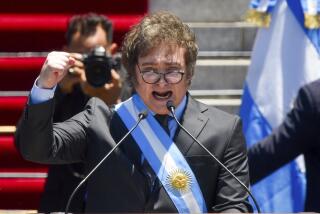Change May Signal More Orthodox Economic Policies : Argentina Gets New Finance Chief
- Share via
BUENOS AIRES — A new minister of economy was sworn in here Tuesday amid private assurances to foreign bankers that the move reflected not only a change of personalities but also a likely move toward more orthodox policies.
“We are being promised that Argentina will continue to meet its international obligations,” an American banker said after meeting with a key Argentine official. “At the same time, the change could signal a positive move toward more traditional domestic economics.”
Juan Sourrouille, a polished, low-key technocrat, replaced the abrasive Bernardo Grinspun as minister of an economy plagued by a $48-billion foreign debt, runaway inflation of more than 700% and the specter of prolonged recession.
Sourrouille, 44, a political independent who had been the government’s principal economic planner, is regarded as a more traditional economist than Grinspun. He is the author of a recently approved economic plan calling for development based on export growth and increased local and foreign investment.
There was no official explanation for the resignations Monday night of Grinspun and central bank President Enrique Garcia Vazquez. By Tuesday, though, it seemed clear that they had left office at the behest of President Raul Alfonsin.
Some Argentine sources said Alfonsin decided to act after it became apparent that there was no means of bridging the differences in economic philosophy between the two men.
Foreign bankers have made no secret of their dislike for Grinspun, but they give Garcia Vazquez high marks for his professionalism.
Last December, after noisy, yearlong negotiations, Grinspun succeeded in fashioning a standby agreement with the International Monetary Fund. That cleared the way for debt renegotiations with 320 foreign banks and the promise of $4.2 billion in fresh credits, steps that have enabled Argentine to avoid defaulting on interest payments.
Grinspun, like Alfonsin, promised that the IMF agreement and the austerity that it implied would not worsen an economic pinch that has already seen record inflation and a decline in real income to the level of 20 years ago.
Under Grinspun, the Alfonsin government pursued what its critics said were paradoxical policies of reducing its deficit and inflation while seeking to stimulate economic growth.
“At the central bank,” one analyst said, “Garcia Vazquez kept a tight rein on the money and argued that IMF guidelines were made to be kept. Over at the Economy Ministry, Grinspun worried about the social impact of austerity and argued that what had been negotiated could always be renegotiated in light of changing realities.”
The new head of the central bank is Alfredo Concepcion, 63, a stalwart of Alfonsin’s Radical Party. He is, like Grinspun, more of a political animal than a technocrat, and some analysts see his appointment as an attempt to keep peace within the party.
Alfonsin argues that, for a young democracy to take root, it must demonstrate visible economic benefits. Citing fears of the social unrest that has struck other Latin American countries pursuing IMF-imposed austerity, he has sought to appease volatile labor unions with wage increases on the same order as inflation.
Nonetheless, because of the accelerating inflation, strikes have become a daily part of Argentine life.
More to Read
Sign up for Essential California
The most important California stories and recommendations in your inbox every morning.
You may occasionally receive promotional content from the Los Angeles Times.













